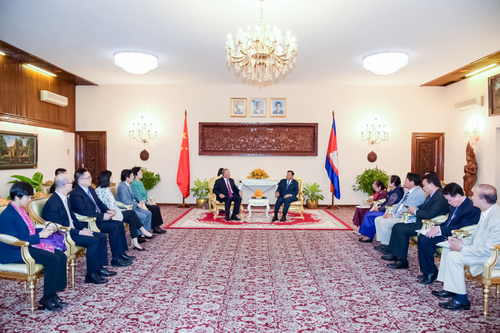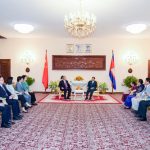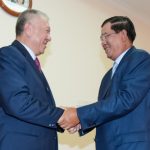 Mr Ho Hau Wah (centre, left) meets with the President of the Senate of Cambodia, Mr Say Chhum (centre, right) in Phnom Penh, Cambodia.
Mr Ho Hau Wah (centre, left) meets with the President of the Senate of Cambodia, Mr Say Chhum (centre, right) in Phnom Penh, Cambodia.
Macao is engaging further with the Kingdom of Cambodia, including via training and education on tourism. Macao is also exploring potential cooperation opportunities with Cambodia in other areas. The Secretary for Social Affairs and Culture, Mr Tam Chon Weng, met in Cambodia on Monday (30 May) the Secretary of State of the Ministry of Tourism of the Kingdom of Cambodia, Mr Tith Chantha. At the meeting a cooperation memorandum on tourism training was signed between the Macao Special Administrative Region (SAR) and the Kingdom of Cambodia. Monday’s signing ceremony was witnessed by the Vice Chairman of the National Committee of the Chinese People's Political Consultative Conference (CPPCC) and former chief executive of the Macao SAR, Mr Ho Hau Wah; and by the Minister of Tourism of the Kingdom of Cambodia, Dr Thong Khon. Mr Ho and Mr Tam had arrived in the country on Sunday (29 May) leading a Government delegation for a three-day business visit to the capital Phnom Penh. More than 50 business representatives from Macao’s tourism, banking, trade and other sectors joined the group. On Monday, the “Macao – Cambodia Investment & Tourism Development Seminar” was held in Phnom Penh, to give businesses in Cambodia a better picture of Macao’s business environment, its efforts and strategies to promote the tourism industry, its development path and the role Macao plays in regional cooperation. During the visit to Cambodia, the delegation held meetings with the Prime Minister of the Kingdom of Cambodia, Mr Hun Sen; and the President of the Senate of Cambodia, Mr Say Chhum, to share views on how to strengthen Cambodia-Macao exchanges. The Macao delegation will return to Macao today.
View gallery


